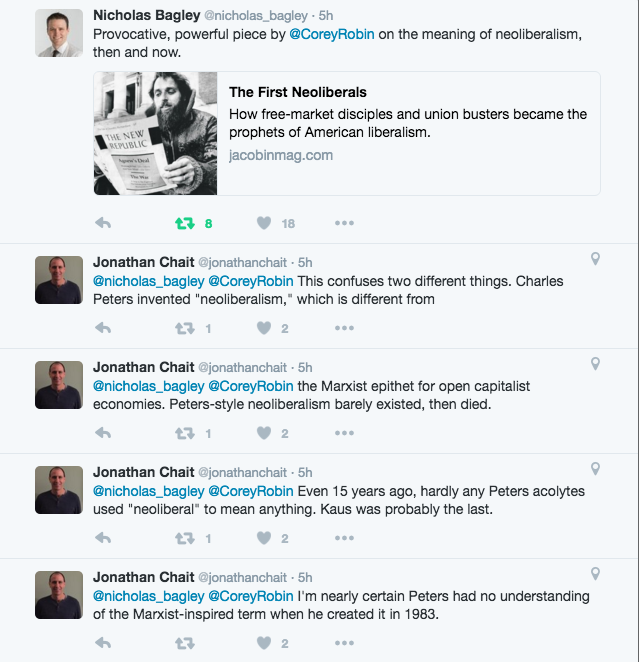Yesterday, New York Magazine’s Jonathan Chait tweeted this:
It was an odd tweet.
On the one hand, Chait was probably just voicing his disgruntlement with an epithet that leftists and Sanders liberals often hurl against Clinton liberals like Chait.
On the other hand, there was a time, not so long ago, when journalists like Chait would have proudly owned the term neoliberal as an apt description of their beliefs. It was The New Republic, after all, the magazine where Chait made his name, that, along with The Washington Monthly, first provided neoliberalism with a home and a face.
Now, neoliberalism, of course, can mean a great many things, many of them associated with the right. But one of its meanings—arguably, in the United States, the most historically accurate—is the name that a small group of journalists, intellectuals, and politicians on the left gave to themselves in the late 1970s in order to register their distance from the traditional liberalism of the New Deal and the Great Society. The original neoliberals included, among others, Michael Kinsley, Charles Peters, James Fallows, Nicholas Lemann, Bill Bradley, Bruce Babbitt, Gary Hart, and Paul Tsongas. Sometimes called “Atari Democrats,” these were the men—and they were almost all men—who helped to remake American liberalism into neoliberalism, culminating in the election of Bill Clinton in 1992.
These were the men who made Jonathan Chait what he is today. Chait, after all, would recoil in horror at the policies and programs of mid-century liberals like Walter Reuther or John Kenneth Galbraith or even Arthur Schlesinger, who claimed that “class conflict is essential if freedom is to be preserved, because it is the only barrier against class domination.” We know this because he recoils in horror today so resolutely opposes the far more tepid versions of that liberalism that we see in the Sanders campaign.
It’s precisely the distance between that lost world of 20th century American labor liberalism and contemporary liberals like Chait that the phrase “neoliberalism” is meant, in part, to register. [click to continue…]

